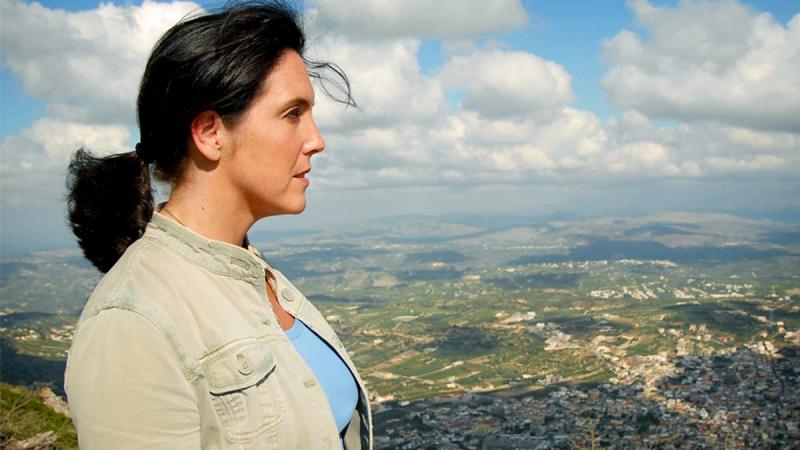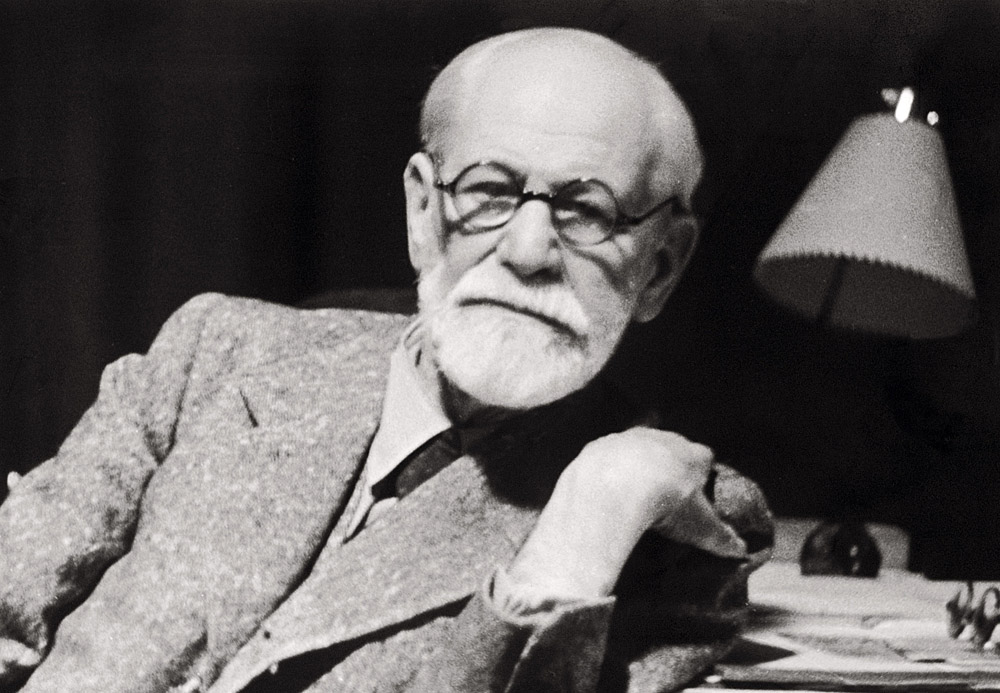Freud: Genius of the Modern World, BBC Four | reviews, news & interviews
Freud: Genius of the Modern World, BBC Four
Freud: Genius of the Modern World, BBC Four
Dr Freud takes his turn in the psychiatrist's chair

Recently the television historian Bettany Hughes, bright-eyed, bushy-tailed, energetic, enthusiastic and rather astonished, has tramped across the continents on our behalf, making a clutch of hour-long documentary introductions to the individuals with the most profound influence on human society.
Yes, it was he: Sigmund Freud, who brought us Freudian slips, the Oedipus complex, ego, super ego and id, penis envy, not to mention all our current touchy-feely talk about our own emotions, PTSD (two of his own sons fought in World War One), the interpretation of dreams, transference, and the opening up to non-censorious scrutiny of the broadest spectrum of sexual attitudes and practice. All this can be laid at the feet of Sigmund, born in 1856 into a poor Jewish family who lived in just one room in Freiburg, then Moravia, now in the Czech Republic.
Sam Goldwyn called Freud the world's greatest expert on love
By the time Freud was three, the family had moved to Vienna. We spent time wandering around the imperial city, where Sigmund was soon to be recognised for his ferocious and precocious intelligence. There were early photographs of a young and handsome Freud, and vintage film of Freud as an old man.
Back in London, we visited the Freud Museum, the house in Hampstead where the family settled after they had fled the Nazis in 1938 – and where Freud lived in the last year of his life. Freud’s office came with him, with its air of Central European bourgeois comfort, his prized collection of antiquities and even the couch on which his patients lay as they talked, talked and talked in the talking cure he pioneered.
There were indications that he proffered the entitled Western individual a poisoned chalice of self-indulgence. But Hughes also told us that the modern science of neurology has confirmed what Freud could not in any practical way, that our decisions are taken in the layers of our brain associated with the unconscious or the subconscious, as she herself talked with various talking heads, professors of philosophy and psychology.
Hughes examined Freud’s own life, in a neat echo of how he treated his patients: Freud only really loved, she said, one woman (actually the jury’s out), his wife of 53 years, Martha Bernays, the daughter of a rabbi, with whom he had six children. New discoveries included some 1,600 letters to and fro during their long courtship, in which Freud advised his beloved against the repression of love. He was too poor to marry until he was 29, and he left his scientific investigation of the nervous system of fish (you couldn’t make it up) to study human psychology ("Tell me about your childhood": Sigmund Freud, pictured below).
 Evidently Freud did not want psychology identified as a Jewish science, and in 1902, instituted regular Wednesday meetings at home in Vienna of psychologists and psychiatrists, forming the first such professional association. In 1925 Sam Goldwyn, speaking for Hollywood, called Freud the world’s greatest expert on love, and indeed offered substantial monetary rewards for Freudian insights, an inducement declined by the good doctor. Again and again we were reminded how Freud himself gave in to his desires. Twenty cigars a day, a substitute he suggested for the satisfactions of masturbation, led to cancer and 30 operations, although he was all of 83 when he died of a self-administered dose of morphine.
Evidently Freud did not want psychology identified as a Jewish science, and in 1902, instituted regular Wednesday meetings at home in Vienna of psychologists and psychiatrists, forming the first such professional association. In 1925 Sam Goldwyn, speaking for Hollywood, called Freud the world’s greatest expert on love, and indeed offered substantial monetary rewards for Freudian insights, an inducement declined by the good doctor. Again and again we were reminded how Freud himself gave in to his desires. Twenty cigars a day, a substitute he suggested for the satisfactions of masturbation, led to cancer and 30 operations, although he was all of 83 when he died of a self-administered dose of morphine.
The final compelling image was of our guide staring in awe at a huge Greek vase from Freud’s own collection which showed the story of Dionysus, the god of wine, madness, fertility, pleasure, ecstasy and rage, not to mention the arts. In this vessel the ashes of Freud repose, in the Columbarium at Golders Green crematorium. And the programme gave to Freud himself the last ambiguous words: "In the end I succeeded, but the struggle is not yet over."
rating
Explore topics
Share this article
The future of Arts Journalism
You can stop theartsdesk.com closing!
We urgently need financing to survive. Our fundraising drive has thus far raised £49,000 but we need to reach £100,000 or we will be forced to close. Please contribute here: https://gofund.me/c3f6033d
And if you can forward this information to anyone who might assist, we’d be grateful.

Subscribe to theartsdesk.com
Thank you for continuing to read our work on theartsdesk.com. For unlimited access to every article in its entirety, including our archive of more than 15,000 pieces, we're asking for £5 per month or £40 per year. We feel it's a very good deal, and hope you do too.
To take a subscription now simply click here.
And if you're looking for that extra gift for a friend or family member, why not treat them to a theartsdesk.com gift subscription?
more TV
 The Diplomat, Season 3, Netflix review - Ambassador Kate Wyler becomes America's Second Lady
Soapy transatlantic political drama keeps the Special Relationship alive
The Diplomat, Season 3, Netflix review - Ambassador Kate Wyler becomes America's Second Lady
Soapy transatlantic political drama keeps the Special Relationship alive
 The Perfect Neighbor, Netflix review - Florida found-footage documentary is a harrowing watch
Sundance winner chronicles a death that should have been prevented
The Perfect Neighbor, Netflix review - Florida found-footage documentary is a harrowing watch
Sundance winner chronicles a death that should have been prevented
 Murder Before Evensong, Acorn TV review - death comes to the picturesque village of Champton
The Rev Richard Coles's sleuthing cleric hits the screen
Murder Before Evensong, Acorn TV review - death comes to the picturesque village of Champton
The Rev Richard Coles's sleuthing cleric hits the screen
 Black Rabbit, Netflix review - grime and punishment in New York City
Jude Law and Jason Bateman tread the thin line between love and hate
Black Rabbit, Netflix review - grime and punishment in New York City
Jude Law and Jason Bateman tread the thin line between love and hate
 The Hack, ITV review - plodding anatomy of twin UK scandals
Jack Thorne's skill can't disguise the bagginess of his double-headed material
The Hack, ITV review - plodding anatomy of twin UK scandals
Jack Thorne's skill can't disguise the bagginess of his double-headed material
 Slow Horses, Series 5, Apple TV+ review - terror, trauma and impeccable comic timing
Jackson Lamb's band of MI5 misfits continues to fascinate and amuse
Slow Horses, Series 5, Apple TV+ review - terror, trauma and impeccable comic timing
Jackson Lamb's band of MI5 misfits continues to fascinate and amuse
 Coldwater, ITV1 review - horror and black comedy in the Highlands
Superb cast lights up David Ireland's cunning thriller
Coldwater, ITV1 review - horror and black comedy in the Highlands
Superb cast lights up David Ireland's cunning thriller
 Blu-ray: The Sweeney - Series One
Influential and entertaining 1970s police drama, handsomely restored
Blu-ray: The Sweeney - Series One
Influential and entertaining 1970s police drama, handsomely restored
 I Fought the Law, ITVX review - how an 800-year-old law was challenged and changed
Sheridan Smith's raw performance dominates ITV's new docudrama about injustice
I Fought the Law, ITVX review - how an 800-year-old law was challenged and changed
Sheridan Smith's raw performance dominates ITV's new docudrama about injustice
 The Paper, Sky Max review - a spinoff of the US Office worth waiting 20 years for
Perfectly judged recycling of the original's key elements, with a star turn at its heart
The Paper, Sky Max review - a spinoff of the US Office worth waiting 20 years for
Perfectly judged recycling of the original's key elements, with a star turn at its heart
 The Guest, BBC One review - be careful what you wish for
A terrific Eve Myles stars in addictive Welsh mystery
The Guest, BBC One review - be careful what you wish for
A terrific Eve Myles stars in addictive Welsh mystery
 theartsdesk Q&A: Suranne Jones on 'Hostage', power pants and politics
The star and producer talks about taking on the role of Prime Minister, wearing high heels and living in the public eye
theartsdesk Q&A: Suranne Jones on 'Hostage', power pants and politics
The star and producer talks about taking on the role of Prime Minister, wearing high heels and living in the public eye

Add comment